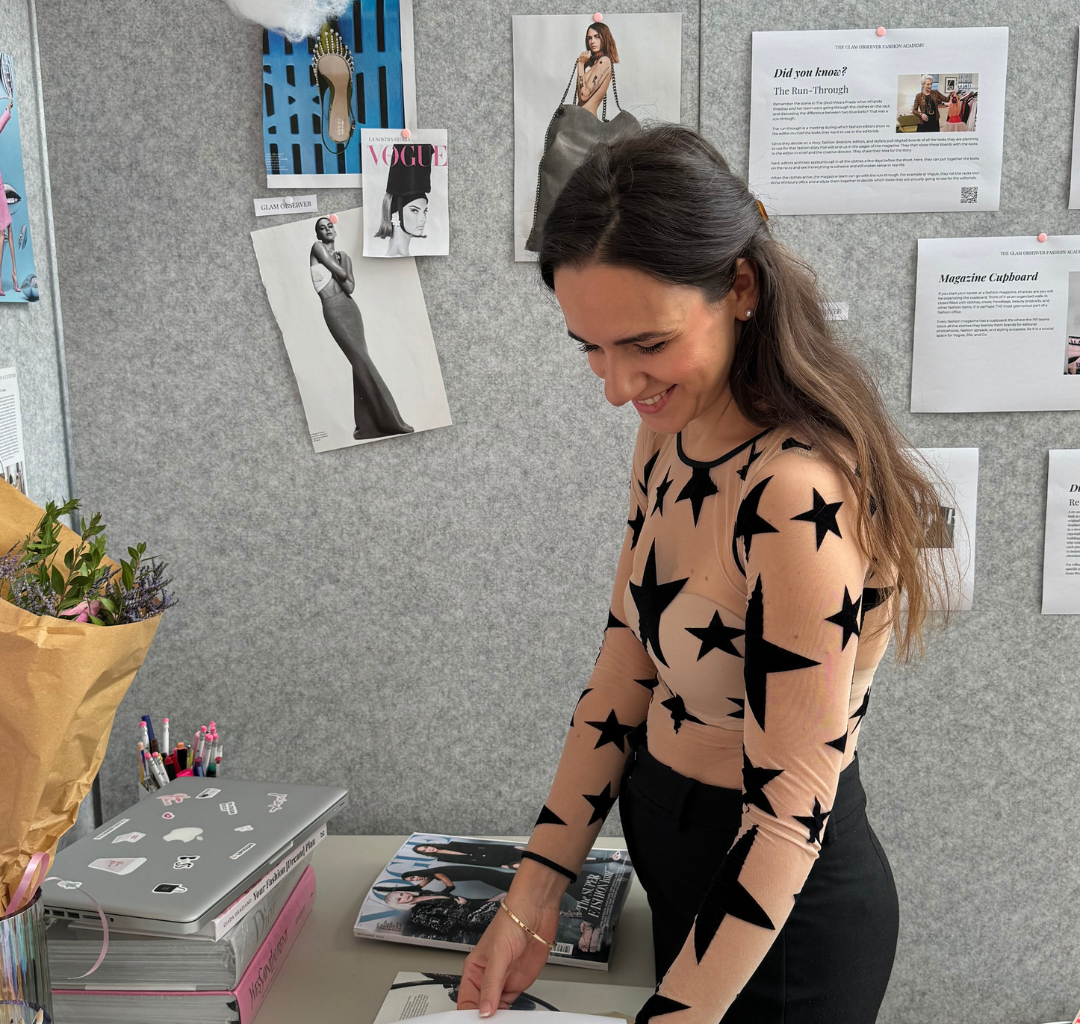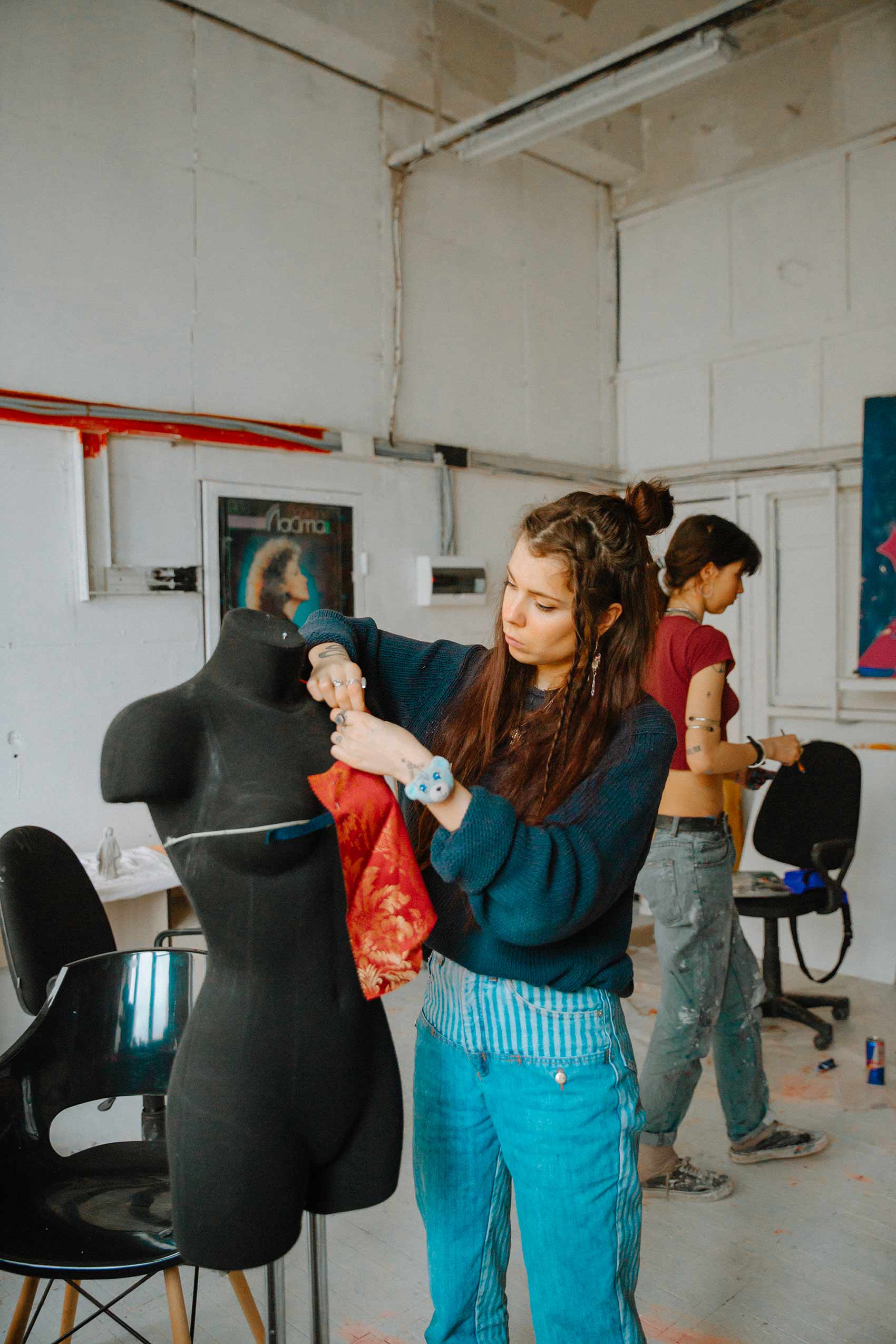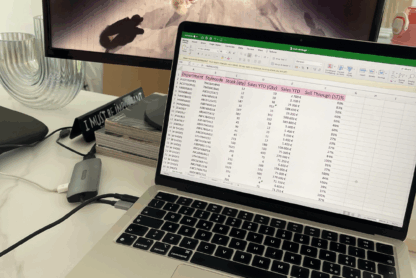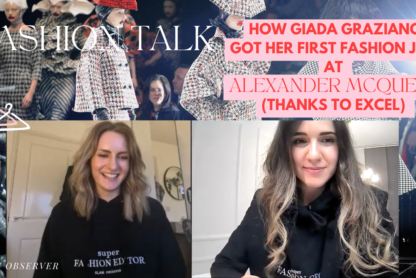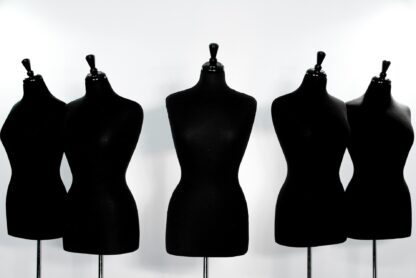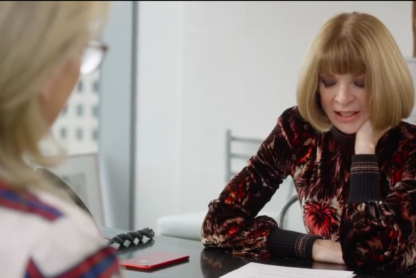One of the most frequently asked questions in my inbox is: “Can I work in fashion without a fashion degree?”
As you can guess by the title of this article, the short answer is: Absolutely YES!
Industry outsiders are often intimidated by the fashion industry because they think that attending a fashion school is a must to work in this industry. So if they studied something unrelated to fashion, many feel like they lost their chance of getting a job in fashion; and if they freshly graduated from high school, they can feel pushed to enroll at a fashion school.
If this is also one of your main struggles nowadays, thinking that you cannot work in fashion without a fashion degree, I want to say that i understand what you are going through. My bachelor’s degree was unrelated to fashion as I studied management engineering. Upon my graduation, I thought I could do nothing with it in the fashion industry, so I enrolled in a Master’s in luxury fashion management, driven by the fear of not being enough. And the illusion that a fashion school would automatically propel me into the glamorous fashion world.
How wrong was I!
When I started applying for fashion internships, I quickly realized that having a fashion degree on my resume didn’t give me more exposure among recruiters. Truth is, fashion school graduates also struggle to break into the industry because the competition is fierce. A fashion school is thus not your entry ticket get a job in fashion.
Educating yourself about the industry is fundamental, don’t get me wrong. Indeed I do run a fashion academy, but just do not take a fashion degree thinking it will open automatically doors to the industry. And at the same time do not think that not having a fashion degree will automatically CLOSE doors to the industry.
When I landed my first fashion internship in the e-commerce department of Alexander McQueen, the recruiter told me something important that shifted my perspective. She told me that she was more impressed by the online courses I took rather than my master’s degree in fashion. Why? Because a master’s degree in fashion is now the norm not an exception and online courses showed my true commitment and represented self learning opportunities and a proactive approach, very much appreciated. I also passed the second phase of the job interview because I successfully completed the Excel test. With these two short examples I just want to show that a fashion degree is not a decisive criteria for recruiters when they look for the perfect candidate; It’s your skills and the unconventional strategies you use to get noticed, which I explain in my free webinar.
When I started my internship at Alexander McQueen, I expected to find many people with fashion degrees, but as I was adding my colleagues to my LinkedIn network, I was surprised to see that in a top company like Alexander McQueen, most of them had a traditional degree in marketing, law, etc. And when I have started interviewing fashion industry professionals for Glam Observer, whenever I ask them “Do you think it is necessary to study fashion to work in this industry?,” the answer has always been NO both from those who attended a fashion school and those who didn’t.
Fashion is a business
The reason why fashion companies hire equally people with a fashion background and those who have degrees in other fields is because they don’t only need creative minds like designers and stylists but also buyers and PRs who drive the business of brands, helping them gain more visibility and profit. Therefore, recruiters always look for candidates with the knowledge and skills a fashion school cannot always teach.
So, which job in fashion can you get without a fashion degree?
There are actually many fashion careers that do not require a fashion degree, which I am about to introduce to you. This is because, as you will notice, are oriented towards analysis, numbers, strategy building and project management, among other tasks and skills that a fashion degree doesn’t necessarily help to gain. I will briefly explain each role and what studies instead of a fashion degree can teach you the required skills.
Are you ready to find your dream fashion job in this list? Let’s go then!
Fashion jobs you can get without a fashion degree
Fashion Marketing
You can work in fashion marketing without a fashion degree. Marketing is a big part of the fashion business. It focuses on promoting a brand, a collection, or a specific product with the goal to drive sales. In short, fashion marketing helps to build a strong brand awareness among its target audience across all channels: magazines, social media, billboards, etc.
Fashion Marketing is a very broad field, so there are all kinds of jobs related to it, for example:
- Digital Marketing
- Merchandising
- Trend Forecasting
- Communication
- Public Relations
- Social media
- Brand manager
- Event planner
- E-commerce
- Product Manager
You can learn about the different careers in fashion marketing here.
What to study to work in fashion marketing
Business and Management studies are a good option because they teach the foundations of business, including marketing. Since Business and Management are international-focused degrees, they can help you work with international fashion companies and stakeholders. What’s more, they provide knowledge of current global markets and teach skills that can be transferable to the marketer role, such as numeric and IT skills, research and data analysis, strategic and logical thinking, planning, communication, and autonomy, among others.
Another possibility is to study Economics or Finance. They will provide you with an understanding of the market situation and structure, and give you mathematical, statistical, and computer skills – all of which are highly requested in Fashion Marketing.
If you are more interested in online marketing, consider studying Digital Marketing and/or Social Media. Nowadays, many marketing campaigns are advertised on the digital platforms, so knowing about social media trends and marketing strategies can be a key to building successful marketing campaigns.
Finally, Communication or Public Relations can also open many doors for you when it comes to building relationships with different stakeholders and creating catchy campaigns.
Fashion PR
Fashion PR is another job you can get without a fashion degree. A Fashion PR manages the public image and communication of a fashion company. Their primary role is to create and maintain a positive public perception of the fashion brand, build brand awareness, and create a positive buzz. The ultimate job of a fashion PR is to make as many people as possible know and talk about the brand.
Fashion PRs take care of building relationships with key figures of the industry, (media, editors, influencers, celebrities…) pitching stories/products to the media, writing press releases, organizing and running events (product launches, press days, and events with editors and influencers, fashion shows, etc.,) packing, dispatching and unpacking samples from editors, stylists and influencers for editorials and red carpet/event dressing, and doing press coverage.
What to study to become a fashion PR
The #1 skill you need for a career in fashion PR is your communication skills – both verbal and written and this is definitely something that you can learn in a degree oriented to languages and communication, psychology, and even law. This is to say that there isn’t one specific degree you need to get into fashion PR.
You can learn more about the role of a fashion PR and the requested skills here.
Fashion Buying & Merchandising
If you are looking for a role that mixes management (80%) and creativity (20%) and you consider yourself a person who loves numbers and strategies, then fashion buying and merchandising could be the job made for you. Fashion Buying and Merchandising don’t require a fashion degree.
Tasked with managing the intersection of creativity, market trends, and consumer demands, buyers and merchandisers play a critical role in ensuring the right products are available at the right time and in the right quantities at a store. They analyze past sales and trends to predict what the customers will want in the future, and use data to provide guidelines to the design and production teams regarding what should be included in the assortment of a store to make sure that the brand is going to sell.
In many companies, the merchandising and buying departments are linked, so pay attention to job opportunities in these both fields and read carefully the job descriptions.
What to study to become a fashion buyer or merchandiser
Because the role of the fashion buyer/merchandiser is oriented towards numbers and analytics, the most common degree for fashion buyers is an economics, business, or finance one.
But again, there isn’t a single rule. Some of my friends graduated in law and today work as buyers at Dolce & Gabbana and other major brands. Finally, since the results of purchasing the right products depend on understanding the consumer, you can apply confidently if you have a major in marketing.
If you graduated in something else, that’s okay too as long as you are Excel savvy because this is the n#1 skill requested in fashion buying and merchandising. And this is something you can learn by yourself so not at a fashion school.
You can learn more about the role of a fashion buyer here and the one of a fashion merchandiser here.
Fashion Stylist
Yes, you read that right: you can become a stylist without a fashion degree. It’s not only the business-oriented roles like marketing, PR and buying which we just saw that are accessible without a fashion degree but also some creative roles like fashion styling.
A stylist is the person behind the beautiful outfits you see in your favorite magazines, advertising campaigns, fashion shows and on the red carpet. They work together with photographers, hair stylists, makeup artists, fashion editors, art director, and other professionals and clients to create looks for campaigns, runways or websites (if you are an e-commerce stylist) and dress models and celebrities for photoshoots and events.
There are different types of stylists: editorial stylist, personal stylist, celebrity stylist, wardrobe stylist, commercial stylist, among others.There are those who work at a fashion company or magazine, while others prefer to freelance as digital stylists, or work for themselves with their own client database.
What to study to work as a fashion stylist
Contrary to what many believe, attending a fashion school to study styling is NOT the only option. In fact, there are many famous stylists who didn’t study fashion or styling. You can study by yourself the different designers and the fabrics and the history of fashion, stay updated on trends, observe fashion campaigns, and watch fashion shows and red carpets to analyze styling techniques and draw inspiration from them.
You can read about how to get a job as a stylist in this article.
E-Commerce Managers
If you are looking for a job in fashion that doesn’t require a fashion degree, consider e-commerce. All fashion brands sell their products online nowadays, so eCommerce managers and specialists are an important asset to take care of managing the online store: from digital merchandisers and buyers to marketing managers, customer care teams, and those who update the website and product selections.
When I was an ecommerce intern at Alexander McQueen, already from day 1 I was taking care of analyzing sales, setting up the online merchandising, uploading the fashion show video on the website during fashion week, running day-to-day tasks to make sure the shopping experience was perfect, sending out the weekly newsletter, activating sales and much more.
What to study to work in fashion e-commerce
You can consider studying management like me, but marketing, business administration, communication, or related fields are also good options to work in fashion e-commerce.
You can also gain technical skills needed for this role, such as web design, graphic design, or data analytics by taking online courses. Normally, it’s not something you study at a fashion school so this is just another way of showing you that you don’t need a fashion degree to work in this industry.
You can learn more about the careers in fashion e-commerce and necessary skills in this article.
Fashion Editor
Fashion Editors decide what goes on the magazine’s fashion pages – from selecting this season’s staples to put on the product pages to which articles to feature and what photo shoots to include in editorials.They are ultimately responsible for the fashion content of a digital and print magazine.
A fashion editor is a writer + stylist. Some editors are more focused on writing, others spend the majority of their time styling.
What to study to become a fashion editor/writer
Most of the renowned fashion editors studied journalism, communication, art history and visual arts, languages, or marketing. Writing about fashion requires a solid knowledge about the industry, but it’s not something you can just learn once at a fashion school. There is lots of research you need to do by yourself, such as watching fashion documentaries, reading books, and catching up on the latest industry news.
You can learn more about the role of a fashion editor here and the writer one here.
Event Production
Fashion producers are essential to the fashion industry. All the biggest events you can think of wouldn’t be made possible without a leader and their team bringing them to life. Fashion shows, product launches, press events, exhibitions, gala, award ceremonies, store openings, and other fashion events help brands gain exposure and promote a new product or collection, so it’s essential that they run smoothly and also stand out creatively.
What to study to work in event production
You can gain the necessary skills through a traditional university degree – for example in project management, event management, communication, or even something like Architecture if you want to be in charge of set design. But if you studied anything else that’s ok as long as you have project management and organizational skills because that’s the foundation of a well-organized project.
You can learn more about working in fashion event production here.
Omnichannel
Another job in fashion you can get without a fashion degree is Omnichannel. Omnichannel marketing involves creating a seamless shopping experience across multiple channels integrating online and offline experiences, aka in physical stores, e-commerce, social media, and mobile apps. It’s about creating a consistent and personalized brand experience for customers, no matter where or how they choose to interact with the brand, and understand customer behavior across different touchpoints.
What to study to work in fashion omnichannel
As you can see, omnichannel is a highly logical, analytical and customer-oriented role, so a degree in marketing, communication or a related field can teach you the necessary skills.
Fashion Brand Manager
A fashion brand manager works on the business side of the brand, taking care of shaping its identity, preserving its image, and constructing the entire experience around the brand. They are in charge of developing and growing the brand.
The main responsibilities of the fashion brand manager include:
- Managing consistency between style, positioning, sales conditions, and range highlights for all markets in all distribution networks.
- Establishing the product strategy based on corporate strategies (product, assortment, pricing)
- Conducting analysis of the market, trends, customers, competitors, production
- Managing all the financial aspects of the company, and allocating the right resources and investments to the various activities to achieve the objectives
- Building relationships with the company’s stakeholders
- And more.
What to study to work in fashion brand management
Although a knowledge in fashion is necessary, the core aspect of the role – managing a company – can be learned in business, marketing, management, economics, or finance studies. They can give you a solid foundation to pursue a career in brand management.
You can learn more about the role of a fashion brand manager in this article.
Fashion Law
To put it simply, fashion law deals with all the legal issues that impact the fashion industry. The purpose of every fashion brand is to sell products, and they undergo a long journey from the idea of the designer to their final creation to ending up in your closet. Therefore, fashion lawyers must ensure adequate legal protection throughout the entire life of a garment.
Fashion lawyers also offer general legal advice to the company on various matters, ensuring that its operations are legally sound. They collaborate with other departments to provide legal perspectives on business strategies and decisions, negotiate contracts, and prevent legal breaches.
What to study to work in fashion law
Fashion law is a particular career in the sense that you cannot learn it by just taking an online course or transferring skills from other degrees and jobs. Legal knwoledge is a must. Therefore, you cannot become a lawyer if you have a degree in communication, art, or marketing, or if you attended a fashion school, so a degree in law is usually the only option.
You can learn more about what fashion lawyers do in this article.
As you can see, there are so many career options in fashion that don’t require a fashion degree. But a little note: if you graduated with something else, that’s okay too and you can still get your dream job. What you studied is not an obstacle to break into fashion. You can later take online fashion courses to learn about fashion and demonstrate your passion and commitment to the industry and continuous learning outside of your formal education.
The dream of getting a job in fashion seems closer now, isn’t it?
How to get a job in fashion without experience
Start from fashion internships
While obtaining a fashion degree is not absolutely necessary to work in this industry, interning is the first step to get into fashion for those no or little experience, you are a student or recent graduate. Whether your dream job is fashion PR, E-commerce or styling, you need to start with internships to learn about the role and get some practical experience.
Fashion internships will also provide you with the required experience that companies demand for entry-level/assistant full-time jobs. They are a common step before getting a full-time position.
I always recommend sending a cover letter and a portfolio along with your resume when you apply for fashion internships.
If you want to learn more tips to get a job in fashion, register in my free webinar.



